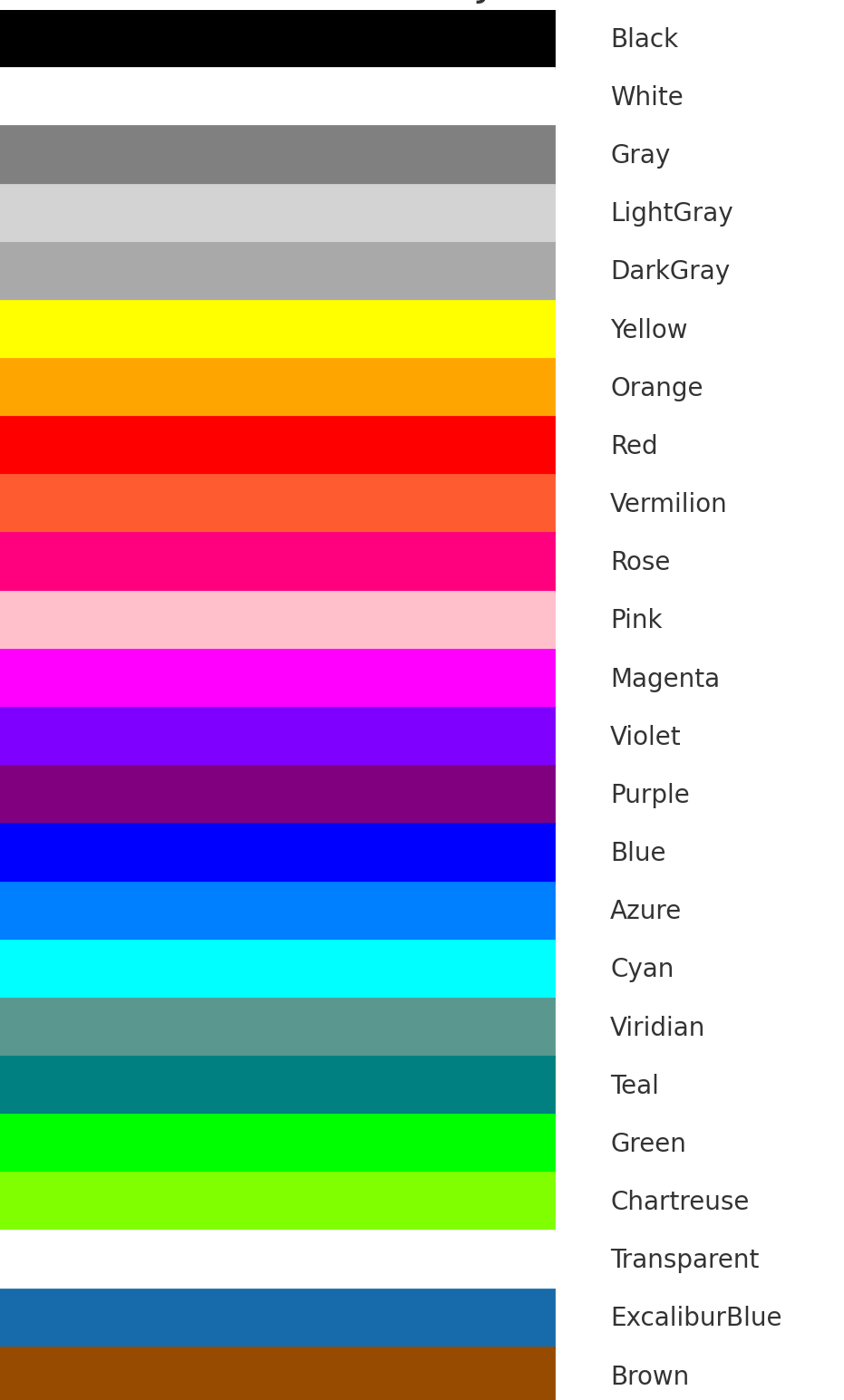Color
Colors
Excalibur provides some color static helpers you can use to work with Hex, RGBA and HSL colors. Colors expose different operations that allow you to change them such as lighten and darken.
Creating colors
tsex .Color (r ,g ,b ,a )ex .Color .fromRGB (r ,g ,b ,a )// HSLAex .Color .fromHSL (h ,s ,l ,a )// Hex, alpha optionalex .Color .fromHex ('#000000')ex .Color .fromHex ('#000000FF')// Float array, alpha optional, components can be omitted (missed will be 0)ex .Color .fromFloatArray ([0.0])ex .Color .fromFloatArray ([0.0, 0.0, 0.0])ex .Color .fromFloatArray ([0.0, 0.0, 0.0, 1.0])// String representation of a color with rgb as default// Options include rgb,hsl,hexmyColor .toString ("rgb")
tsex .Color (r ,g ,b ,a )ex .Color .fromRGB (r ,g ,b ,a )// HSLAex .Color .fromHSL (h ,s ,l ,a )// Hex, alpha optionalex .Color .fromHex ('#000000')ex .Color .fromHex ('#000000FF')// Float array, alpha optional, components can be omitted (missed will be 0)ex .Color .fromFloatArray ([0.0])ex .Color .fromFloatArray ([0.0, 0.0, 0.0])ex .Color .fromFloatArray ([0.0, 0.0, 0.0, 1.0])// String representation of a color with rgb as default// Options include rgb,hsl,hexmyColor .toString ("rgb")
Working with colors
Since Javascript does not support structs, if you change a color "constant" like Color.Black
it will change it across the entire game. You can safely use the color operations
like Color.lighten and Color.darken because they clone the color to
return a new color. However, be aware that this can use up memory if used excessively.
Just be aware that if you directly alter properties (i.e. Color.r, etc.) , this will change it for all the code that uses that instance of Color.
Default Colors
Here are some of the default colors and examples of what they look like.

Random Colors
There is a static method on the color class that allows for a random color to be provided
tsrndmColor =ex .Color .random ();
tsrndmColor =ex .Color .random ();
Lerping Colors
The Color.lerp static method linearly interpolates between two colors.
start— The startingColorend— The targetColort— The interpolation factor, between0(start) and1(end)colorSpace— The interpolation mode:hsl(default),rgborlrgb
Difference between interpolation modes:
- HSL — performing interpolation in HSL color space for smooth hue transitions, then converted back to RGB. Balanced for speed and gradient realism;
- RGB — linear interpolation for all R, G, B and A components separately, fastest mode for now;
- LRGB — applying alpha correcting to R, G and B components, then interpolating it and A linear for more realistic gradient at the cost of speed.
Returns: A new Color representing the interpolated result.
Example:
tsmidHSL =ex .Color .lerp (ex .Color .Red ,ex .Color .Blue , 0.5); // A smooth purple blend, keeps brightness from source colorsconstmidRGB =ex .Color .lerp (ex .Color .Red ,ex .Color .Blue , 0.5, 'rgb'); // A fast purple blend, darker than realconstmidLRGB =ex .Color .lerp (ex .Color .Red ,ex .Color .Blue , 0.5, 'lrgb'); // A realistic purple blend
tsmidHSL =ex .Color .lerp (ex .Color .Red ,ex .Color .Blue , 0.5); // A smooth purple blend, keeps brightness from source colorsconstmidRGB =ex .Color .lerp (ex .Color .Red ,ex .Color .Blue , 0.5, 'rgb'); // A fast purple blend, darker than realconstmidLRGB =ex .Color .lerp (ex .Color .Red ,ex .Color .Blue , 0.5, 'lrgb'); // A realistic purple blend